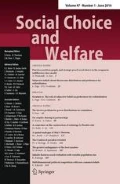Abstract
We generalize the classical expected-utility criterion by weakening transitivity to Suzumura consistency. In the absence of full transitivity, reflexivity and completeness no longer follow as a consequence of the system of axioms employed and a richer class of rankings of probability distributions results. This class is characterized by means of standard expected-utility axioms in addition to Suzumura consistency. An important feature of some members of our new class is that they allow us to soften the negative impact of so-called paradoxes that involve preference reversals without abandoning the expected-utility framework altogether.
Similar content being viewed by others
References
Allais M (1953) Le comportement de l’homme rationnel devant le risque: critique des postulats et axiomes de l’école Americaine. Econometrica 21:503–546
Aumann RJ (1962) Utility theory without the completeness axiom. Econometrica 30:445–462
Aumann RJ (1964) Utility theory without the completeness axiom: a correction. Econometrica 32:210–212
Aumann RJ (2000) Collected papers, vol 1. MIT Press, Cambridge, MA
Bell DE (1982) Regret in decision making under uncertainty. Oper Res 30:961–981
Bossert W, Sprumont Y, Suzumura K (2005) Consistent rationalizability. Economica 72:185–200
Bossert W, Suzumura K (2010) Consistency, choice, and rationality. Harvard University Press, Cambridge, MA
Camerer C (1995) Individual decision making. In: Kagel JH, Roth AE (eds) Handbook of experimental economics. Princeton University Press, Princeton, NJ, pp 587–704
Dubra J, Maccheroni F, Ok EA (2004) Expected utility theory without the completeness axiom. J Econ Theory 115:118–133
Fishburn PC (1971) One-way expected utility with finite consequence spaces. Ann Math Stat 42:572–577
Fishburn PC (1972) Alternative axiomatizations of one-way expected utility. Ann Math Stat 43:1648–1651
Fishburn PC (1982) Nontransitive measurable utility. J Math Psychol 26:3l–67
Fishburn PC (1991) Nontransitive preferences in decision theory. J Risk Uncertain 4:113–134
Fishburn PC, LaValle IH (1988) Context-dependent choice with nonlinear and nontransitive preferences. Econometrica 56:1221–1239
Kahneman D, Tversky A (1979) Prospect theory: an analysis of decision under risk. Econometrica 47:263–291
Kreps DM (1988) Notes on the theory of choice. Westview Press, Boulder, CO
Loomes G, Sugden R (1982) Regret theory: an alternative theory of rational choice under uncertainty. Econ J 92:805–824
Luce RD (1956) Semiorders and the theory of utility discrimination. Econometrica 24:178–191
Luce RD, Raiffa H (1957) Games and decisions. Wiley, New York, NY
Machina MJ (1983) Generalized expected utility analysis and the nature of observed violations of the independence axiom. In: Stigum BP, Wenstøp F (eds) Foundations of utility and risk theory with applications. Reidel, Dordrecht, pp 263–293
Rabin M (1998) Psychology and economics. J Econ Lit 36:11–46
Sen AK (1969) Quasi-transitivity, rational choice and collective decisions. Rev Econ Stud 36:381–393
Simon HA (1955) A behavioral model of rational choice. Q J Econ 69:99–118
Suzumura K (1976) Remarks on the theory of collective choice. Economica 43:381–390
Suzumura K (1978) On the consistency of libertarian claims. Rev Econ Stud 45:329–342
Szpilrajn E (1930) Sur l’extension de l’ordre partiel. Fundam Math 16:386–389
Thrall RM (1954) Applications of multidimensional utility theory. In: Thrall RM, Coombs CH, Davis RL (eds) Decision processes. Wiley, New York, NY, pp 181–186
Tversky A, Thaler RH (1990) Anomalies: preference reversals. J Econ Perspect 4:201–211
von Neumann J, Morgenstern O, (1944, second ed 1947) Theory of games and economic behavior. Princeton University Press, Princeton, NJ
Acknowledgments
We thank Clemens Puppe, an associate editor and a referee for their valuable comments on an earlier version of the paper. Financial support from a Grant-in-Aid for Specially Promoted Research from the Ministry of Education, Culture, Sports, Science and Technology of Japan for the Project on Economic Analysis of Intergenerational Issues (grant number 22000001), the Fonds de Recherche sur la Société et la Culture of Québec, and the Social Sciences and Humanities Research Council of Canada is gratefully acknowledged.
Author information
Authors and Affiliations
Corresponding author
Rights and permissions
About this article
Cite this article
Bossert, W., Suzumura, K. Expected utility without full transitivity. Soc Choice Welf 45, 707–722 (2015). https://doi.org/10.1007/s00355-015-0876-5
Received:
Accepted:
Published:
Issue Date:
DOI: https://doi.org/10.1007/s00355-015-0876-5



